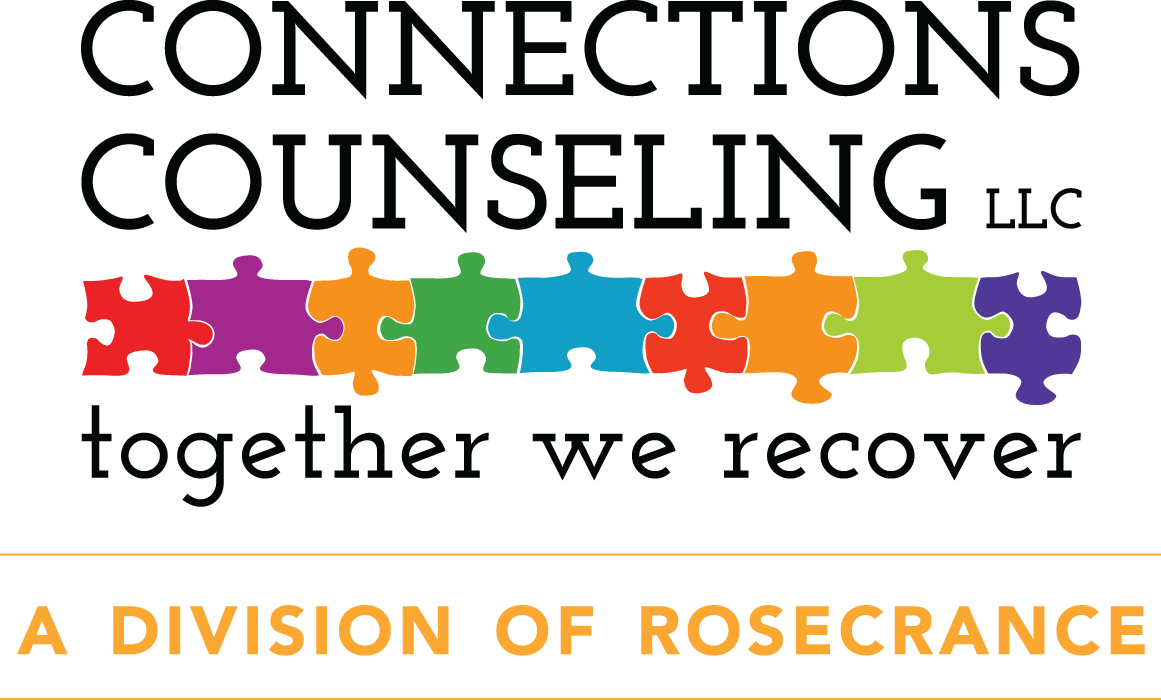Group Therapy
Connections Counseling offers a variety of groups to meet the needs of all ages, gender and specific areas of focus. Group involvement is typically a duration of at least 90 days with options to continue or become a group mentor.
Groups provide positive group support ranging from recovery, anxiety, depression and other co-occurring topics. As our clients attend groups, they have opportunities to decrease isolation, increase social connections and feel the true essence of acceptance and hope by both peers and staff.

Women's Groups (Wise, Wonderful Women)
This ongoing process group is for adult women who are interested in creating connections with other women and identifying, educating, sharing, and receiving feedback on a variety of topics. Those topics include but are not limited to recovery, mental health, relationships, and self-development. This group allows a safe space for women to be their true, authentic selves, develop coping skills, and utilize those skills in their respective lives.
Wisdom Groups (Real Wisdom and Wisdom and Recovery)
Wisdom in recovery is an open, mixed-gender, adult processing support and skill-building group. Members are in recovery or working towards sobriety from substance use disorders. This group covers a wide variety of topics with input from members on issues and challenges they are facing. Topics include education and discussion on addressing triggers and cravings, relapse prevention, as well as social support and relationship building.
Processing challenges and celebrating achievements together gives group members a chance to learn and practice new skills and to fully embrace a life of healthy recovery.
Trauma Group (Embracing Our Whole Selves)
The group is a 12-week closed group comprised of 8-10 individuals. The group may have either a mix of genders or a single gender format. First, the group will establish a sense of safety and trust. Group members will learn and practice grounding skills to support the ability to fully participate. At no time will group members be asked to share the specifics of any trauma they have experienced. Topics the group will explore include the influence of culture on their lives, the impact of messages they received from their families, and to celebrate the journey they have taken to grow and heal. Lastly, the group will use “parts work” (aka Internal Family Systems) to address how their defenses “kept them safe” and how they can work to negotiate a new way of being, working together with those “parts.” Throughout the 12-week group, there will be an emphasis on developing self-compassion for their recovery journey.
Body Image Group (Love My Body, Love Myself)
In this group we aim to help participants build self-worth that is independent from one’s body, decrease experiences of distress in your relationship with one’s body, work to build and increase body appreciation, and learn how to work with one’s body rather than fight against it. This group will cover topics related to body image as members work to heal their relationships with their bodies and themselves. Participation in the group explores the ways body image impacts many aspects of life, such as mental health, relationships, how we experience pleasure, and more. Each week, the group will participate in a grounding experience, have time to connect with themselves through independent self-reflection, and have opportunities to connect with each other through group discussion.
DBT Groups (Dialectical Behavior Therapy)
DBT is a group therapy that helps participants learn to use skillful behaviors. Research has shown that using DBT skills can help decrease impulsive behaviors such as substance use, self-harm, suicide, binge eating, and other mood-dependent behaviors. DBT can help participants build a life worth living, because in this group, you will learn alternative, more skillful and effective behaviors to use instead. Each week in group, we will focus on teaching a unique set of skills that fall into one of the four categories listed above. We will ask participants to practice these things throughout the week. Each week we will spend a few minutes in the group practicing mindfulness and the group facilitators will give some instruction and guidance about how to practice that week’s skills. In the group we will ask group members to share about challenges and successes they encountered when practicing the DBT skills in their lives. This is an opportunity for people in the group to learn from each other, and to explore what it means to use these DBT skills in real-life situations.
